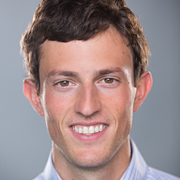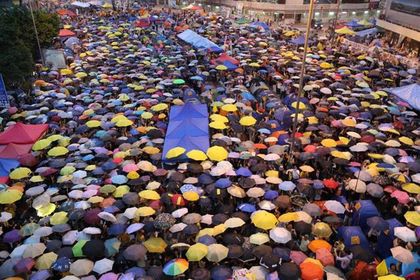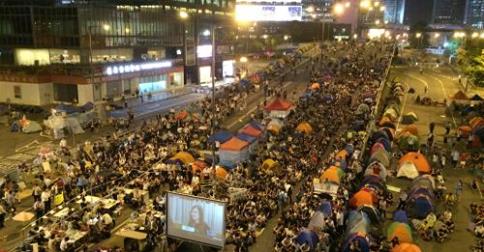Taking Back Hong Kong's Future
By JOSHUA WONG CHI-FUNGOCT. 29, 2014
HONG KONG — Tuesday night marked one month since the day Hong Kong’s police attacked peaceful pro-democracy protesters with tear gas and pepper spray, inadvertently inspiring thousands more people to occupy the streets for the right to freely elect Hong Kong’s leaders.
I was being detained by the police on that day, Sept. 28, for having participated in a student-led act of civil disobedience in front of the government’s headquarters. I was held for 46 hours, cut off from the outside world. When I was released, I was deeply touched to see thousands of people in the streets, rallying for democracy. I knew then that the city had changed forever.
Since the return of Hong Kong to China in 1997, less than a year after I was born, the people of this city have muddled through with a political system that leaves power in the hands of the wealthy and the well-connected. Many of us, especially people of my generation, had hoped democratic change was finally coming after years of promises from Beijing that we would eventually have free elections. Instead, in late August, Beijing ruled that Hong Kong’s oligarchy will remain in charge. Universal suffrage became a shattered dream.
But not for long. The thousands of protesters, most of them young, who continue to occupy main areas of the city are showing every day how political change will eventually come: through perseverance. Our peaceful democracy demonstration has demolished the myth that this is a city of people who care only about money. Hong Kongers want political reform. Hong Kongers want change.
My generation, the so-called post-90s generation that came of age after the territory was returned to China, would have the most to lose if Hong Kong were to become like just another mainland Chinese city, where information is not freely shared and the rule of law is ignored. We are angry and disappointed that Beijing and the local administration of Leung Chun-ying are trying to steal our future.
The post-90s generation is growing up in a vastly changed city from that of our parents and grandparents. Earlier generations, many of whom came here from mainland China, wanted one thing: a stable life. A secure job was always more important than politics. They worked hard and didn’t ask for much more than some comfort and stability.
The people of my generation want more. In a world where ideas and ideals flow freely, we want what everybody else in an advanced society seems to have: a say in our future.
Our bleak economic situation contributes to our frustrations. Job prospects are depressing; rents and real estate are beyond most young people’s means. The city’s wealth gap is cavernous. My generation could be the first in Hong Kong to be worse off than our parents.
My parents are not political activists. But over the past few months, because of my prominent role in the protest movement, my family’s home address has been disclosed online, and my parents have been harassed.
Despite the aggravation, my parents respect my choice to participate in the demonstrations. They give me freedom to do what I believe is important.
Other young people are not so lucky. Many teenagers attend our protests without their parents’ blessing. They return home to criticism for fighting for democracy, and many end up having to lie to their parents about how they are spending their evenings. I’ve heard stories of parents deleting contacts and social media exchanges from their teenage children’s mobile phones to prevent them from joining activist groups.
My generation’s political awakening has been simmering for years. Nearly five years ago, young people led protests against the wasteful construction of a new rail line connecting Hong Kong to mainland China. In 2011, many young people, myself included, organized to oppose a national education program of Chinese propaganda that Beijing tried to force on us. I was 14 at the time, and all I could think was that the leaders in Beijing have no right to brainwash us with their warped view of the world.
If there is anything positive about the central government’s recent decision on universal suffrage, it’s that we now know where we stand. Beijing claims to be giving us one person, one vote, but a plan in which only government-approved candidates can run for election does not equal universal suffrage. In choosing this route, Beijing has showed how it views the “one country, two systems” formula that has governed the city since 1997. To Beijing, “one country” comes first.
I believe the August decision and the Hong Kong police’s strong reaction to the protesters — firing more than 80 canisters of tear gas into the crowds and using pepper spray and batons — was a turning point. The result is a whole generation has been turned from bystanders into activists. People have been forced to stand up and fight.
Today, there are many middle school students active in the pro-democracy movement: Students as young as 13 have boycotted classes, while teenagers of all ages have been staying overnight at the protest sites. They protest gracefully, despite being attacked by police and hired thugs.
Some people say that given the government’s firm stance against genuine universal suffrage, our demands are impossible to achieve. But I believe activism is about making the impossible possible. Hong Kong’s ruling class will eventually lose the hearts and minds of the people, and even the ability to govern, because they have lost a generation of youth.
In the future I may be arrested again and even sent to jail for my role in this movement. But I am prepared to pay that price if it will make Hong Kong a better and fairer place.
The protest movement may not ultimately bear fruit. But, if nothing else, it has delivered hope.
I would like to remind every member of the ruling class in Hong Kong: Today you are depriving us of our future, but the day will come when we decide your future. No matter what happens to the protest movement, we will reclaim the democracy that belongs to us, because time is on our side.
Joshua Wong Chi-fung is a co-founder of the student activist group Scholarism. This article was translated from the Chinese for The New York Times.
参考: http://www.nytimes.com/2014/10/30/opinion/joshua-wong-taking-back-hong-kongs-future.html?_r=1
























 Jimmy
Jimmy 
















